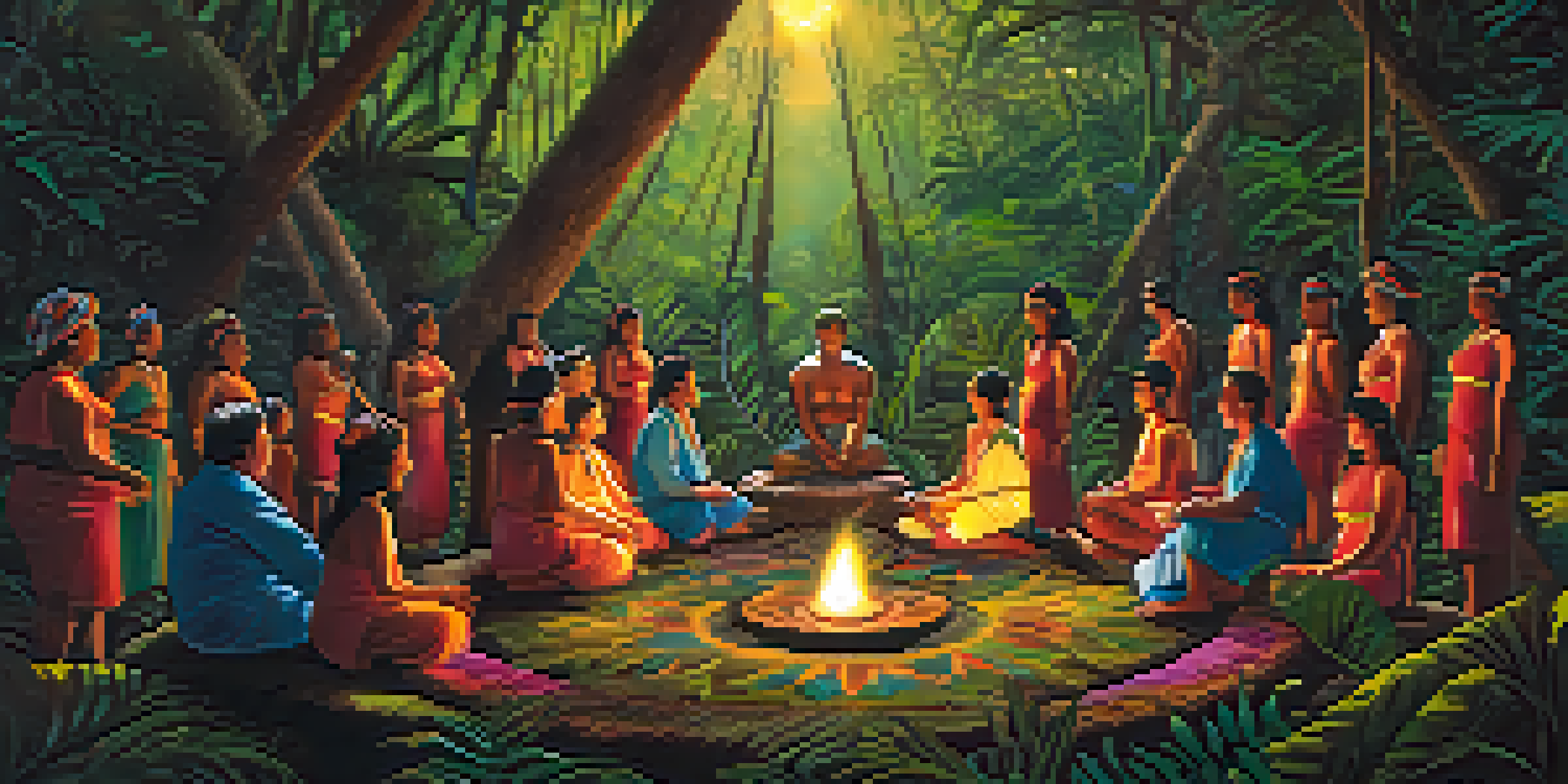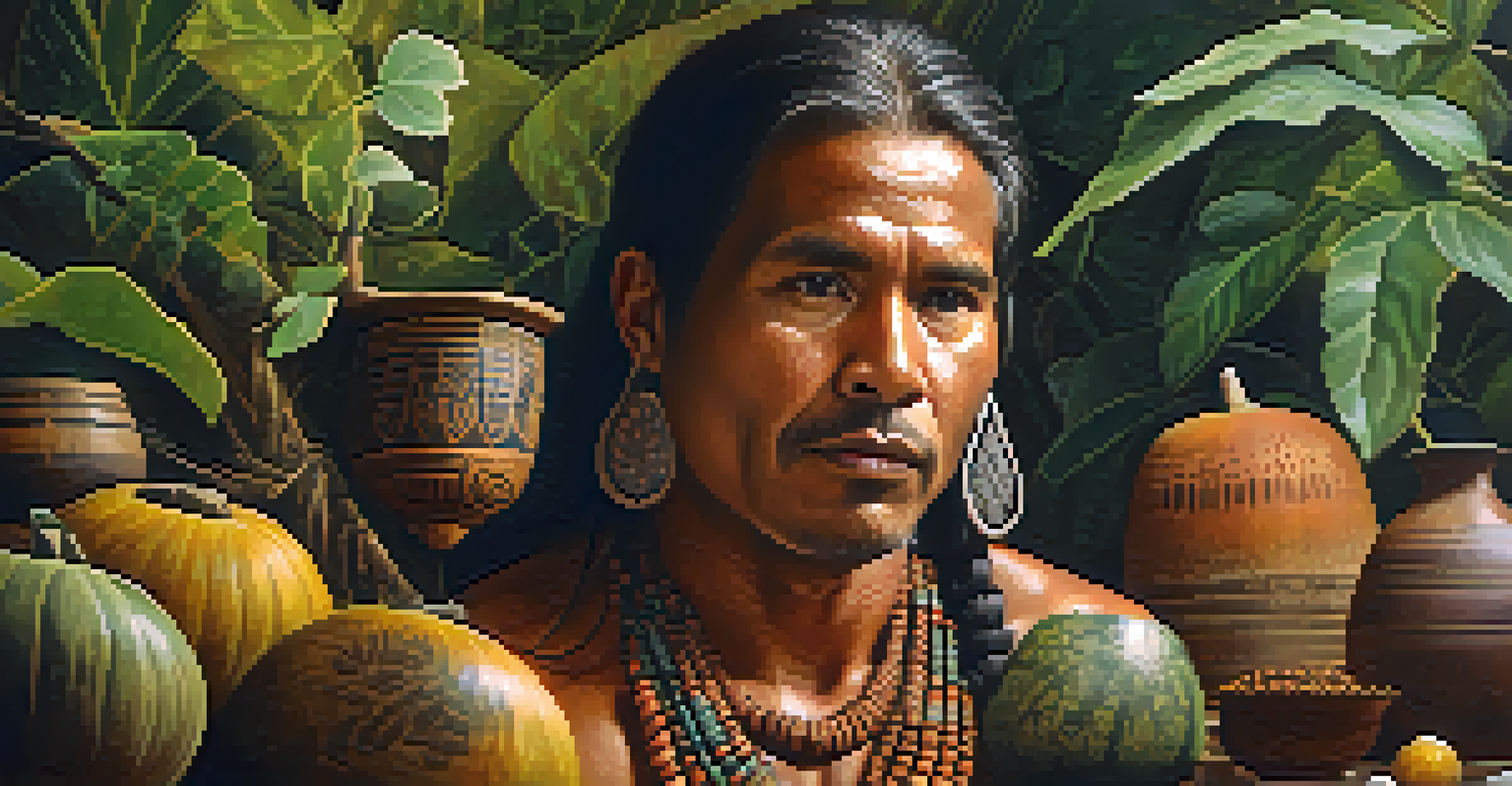The Role of Shamans in Ayahuasca Ceremonies Explained

Understanding Ayahuasca and Its Cultural Significance
Ayahuasca is a powerful plant medicine used traditionally in South America, primarily by indigenous communities. This brew is made from the Banisteriopsis caapi vine and the Psychotria viridis leaf, and it has been revered for centuries for its psychoactive properties. The ceremonies surrounding Ayahuasca are not just about the drink itself; they are deeply rooted in cultural and spiritual practices.
Ayahuasca is not just a plant medicine; it is a tool for transformation, a bridge to the sacred and a means to explore the depths of the human experience.
These ceremonies often involve guided experiences that can lead to profound insights and healing. For many participants, Ayahuasca serves as a tool for introspection, helping them confront personal challenges or traumas. This transformative journey is facilitated by skilled shamans who are integral to the process.
Understanding the cultural significance of Ayahuasca sets the stage for appreciating the role of shamans. They are not merely guides; they are custodians of ancient knowledge and traditions that uphold the spiritual and therapeutic aspects of the experience.
Who Are Shamans and What Do They Do?
Shamans, often referred to as healers or spiritual leaders, play a crucial role in Ayahuasca ceremonies. They are individuals who have undergone extensive training and have a deep understanding of the plants, rituals, and spiritual practices involved. Their expertise allows them to navigate the complexities of the Ayahuasca experience.

In a ceremony, shamans lead participants through the process, setting intentions and creating a safe environment for healing. They often use traditional songs, known as icaros, which are believed to guide the energy of the ceremony and connect participants to the spirit of the medicine. This musical element is vital, as it helps to harmonize the experience.
Ayahuasca's Cultural Importance
Ayahuasca is a traditional plant medicine revered for its psychoactive properties and cultural significance among indigenous communities.
The shaman's presence is pivotal in ensuring that participants feel supported and protected throughout their journey. Their role is not just to facilitate the ceremony but to be a bridge between the physical and spiritual realms, helping individuals tap into their inner wisdom.
The Shaman's Role in Preparing the Ceremony
Preparation for an Ayahuasca ceremony is a significant aspect of the shaman's role. This process often begins days or even weeks in advance, as shamans prepare themselves physically and spiritually. They may engage in fasting, prayer, and meditation to align their energies with the medicine.
The shaman is a mediator between the physical and spiritual worlds, guiding us through the labyrinth of our own consciousness.
The shaman also prepares the ceremonial space, creating an atmosphere that is conducive to healing. This includes setting up an altar, arranging seating, and ensuring that the environment is safe for participants. The careful curation of these elements helps to create a sacred space where deep healing can occur.
The preparation extends to the participants as well, with shamans often providing guidelines on how to approach the experience. This includes dietary restrictions and mental preparation, which are crucial for maximizing the benefits of the ceremony.
Navigating the Ayahuasca Experience with a Shaman
During the Ayahuasca ceremony, the shaman's guidance is invaluable as participants begin to experience the effects of the brew. They serve as a source of comfort and support, helping individuals navigate intense emotions or visions that may arise. This guidance is essential, as the experience can be both enlightening and overwhelming.
Shamans utilize their knowledge of the medicine and their intuition to assist participants through challenging moments. They may sing icaros, offer encouragement, or perform energetic cleansings to help individuals release negativity. This personalized attention can make a significant difference in the overall experience.
Shamans Guide Healing Journeys
Shamans play a crucial role in Ayahuasca ceremonies, providing guidance and support to participants as they navigate their transformative experiences.
Ultimately, the shaman's presence helps to create a safe container for exploration and healing. Participants often emerge from the ceremony with a sense of clarity and purpose, largely thanks to the shaman's adept facilitation.
The Importance of Integration After the Ceremony
Integration is a crucial phase following an Ayahuasca ceremony, and shamans often play a key role in this process. After participants have experienced the journey, they may need support to make sense of their insights and emotions. Shamans can provide guidance on how to integrate these experiences into daily life.
This may involve one-on-one discussions, additional ceremonies, or even suggestions for lifestyle changes that align with the insights gained. The shaman's experience allows them to offer tailored advice, helping participants find practical ways to apply their newfound wisdom.
The integration process can be challenging, as it often requires individuals to confront difficult truths about themselves. However, with the shaman's support, participants can navigate this transition more smoothly, leading to lasting personal growth.
Cultural Respect and Ethical Considerations
As interest in Ayahuasca ceremonies grows globally, there is an increasing need for cultural respect and ethical considerations. Many shamans come from indigenous backgrounds and carry traditions that are sacred to their communities. It's essential for outsiders to approach these ceremonies with respect and an understanding of their cultural significance.
Participating in an Ayahuasca ceremony should not be seen as a mere recreational activity. Ethical practices involve acknowledging the shaman's role, compensating them fairly for their work, and respecting the sacred nature of the experience. This approach fosters a more authentic and respectful connection between participants and shamans.
Ethical Practices in Ceremonies
Cultural respect and ethical considerations are essential when participating in Ayahuasca ceremonies, ensuring fair compensation for shamans and sustainability of practices.
Moreover, ethical considerations also extend to the sustainability of the plants used in these ceremonies. It’s crucial to support practices that preserve the environment and the cultures that have nurtured these traditions for generations.
The Future of Ayahuasca and Shamanism
The growing popularity of Ayahuasca has sparked conversations about its future and the role of shamans. As more people seek out these transformative experiences, it's vital to ensure that the practices remain rooted in their cultural origins. This balance is key to preserving the integrity of the ceremonies.
Shamans are increasingly becoming ambassadors for their traditions, sharing their knowledge and experiences with a broader audience. This can lead to greater awareness and appreciation of the cultural contexts in which these ceremonies exist, but it also poses risks of commercialization.

Moving forward, it's essential to strike a balance between accessibility and authenticity. Supporting shamans and their communities can help ensure that the sacred nature of Ayahuasca ceremonies is honored, benefiting both participants and indigenous cultures alike.